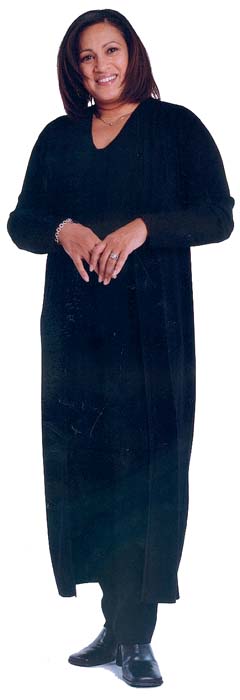|
Este informe no está disponible en español.
THE NEW YORK TIMES
QUESTIONS FOR MARIA PEREZ-BROWN:
Sweet 15
By MIREYA NAVARRO
January 21, 2001
Copyright © 2001 NEW YORK TIMES. All Rights Reserved.
 The creator of a Latino show for kids, which just made its debut on Nickelodeon, talks about changing the faces of television. The creator of a Latino show for kids, which just made its debut on Nickelodeon, talks about changing the faces of television.
Photograph by Holger Keifel.
©Copyright Holger Keifel.
------------------------------------------------------------------------
"Taina" is about a 15-year-old Latina who lives in New York and whose parents were born in Puerto Rico. Is there an example of how your life has been translated into her story on TV?
The quinceanero show. Taina turns 15, and she wants to wear a very hip contemporary dress, but her mother's insisting that Taina wear the traditional dress that has been handed down from her great-grandmother to her grandmother to her. A horrendous dress. It had tons of ruffles, tons of bows. It was like a giant cotton candy. You sat in the middle of it and you looked like the doll that was sitting on top of the table.
Will that appeal to Anglo viewers?
I think so. Anglo audiences would have experienced to some degree sweet-16 parties. And bar mitzvahs. The coming-of-age celebration is a universal topic.
So is it a good time to be selling Latino stories to producers and networks?
The environment is a little more open now. I still have my doubts. I don't think necessarily because they are open to hearing pitches that involve Latino characters means they are really ready to invest the money that it would take to make sure that a pilot goes to a series.
What do television executives expect when they're entertaining pitches for a Latino show?
You find the whole range. You find people who say, "I want the next Rosie Perez," because Rosie Perez is the only actress that they happen to be familiar with. Some are more open-minded, because they'll say, "Yeah, I know there are Latino lawyers and Latino architects."
What are executives reacting to when they reject something as too Latino or not Latino enough?
Just the way the characters look, or the way the characters dress or talk. A lot of times for a woman, they go, "This is too Latino" because she's dressed in a red dress and she's got a voluptuous body.
Are there specific stereotypes you are setting out to dispel through the show?
Yes, I want to show that Latinos from different backgrounds can work together. We've had Dominicans, we've had Puerto Ricans and we've had Mexicans. And it's really important we dispel one of the biggest stereotypes in this entire movie and television industry -- that Latinos don't get along. On camera, one of the biggest stereotypes I also want to correct is that comedy can come from the characters in your show whether they have an accent or not.
In focus groups for "Taina," did you see major differences in the shows Latinos, blacks and whites watch on TV?
They wanted to see good television. They loved "Seinfeld" because it was funny. And when they were asked, "Is the New York that's in 'Seinfeld' the New York that you live in?" they absolutely said, "No, but it's still a funny show." Some of the shows that reflect New York City, they don't even have black people walking down the street. That's what's so sad -- you look at the creators, and you say, "Can you at least get some extras?"
What is it that Latino actors bring to the medium that others don't?
They add dimension to the characters because you can write a Latino character and they get it. I can't tell you how many times the actors in "Taina" would go, "Oh, my God, that's exactly what happened to me in my life."
Did you get any Jewish, Italian, Greek -- you know, dark-haired white girls -- trying out for the show?
When you put out a call for Latinos, agents tend to send you anybody they have with dark hair who sounds as if she could have been related to a romance language. There were Italians, there were Greeks. And you know what? It would have been very difficult for me if the call was between, let's say, an Italian girl with dark hair who looked Latina and a Puerto Rican girl who looked the same way. Because at that point, I needed to go for the best actress. Thank goodness we have enough talented Latina actresses.
| 
